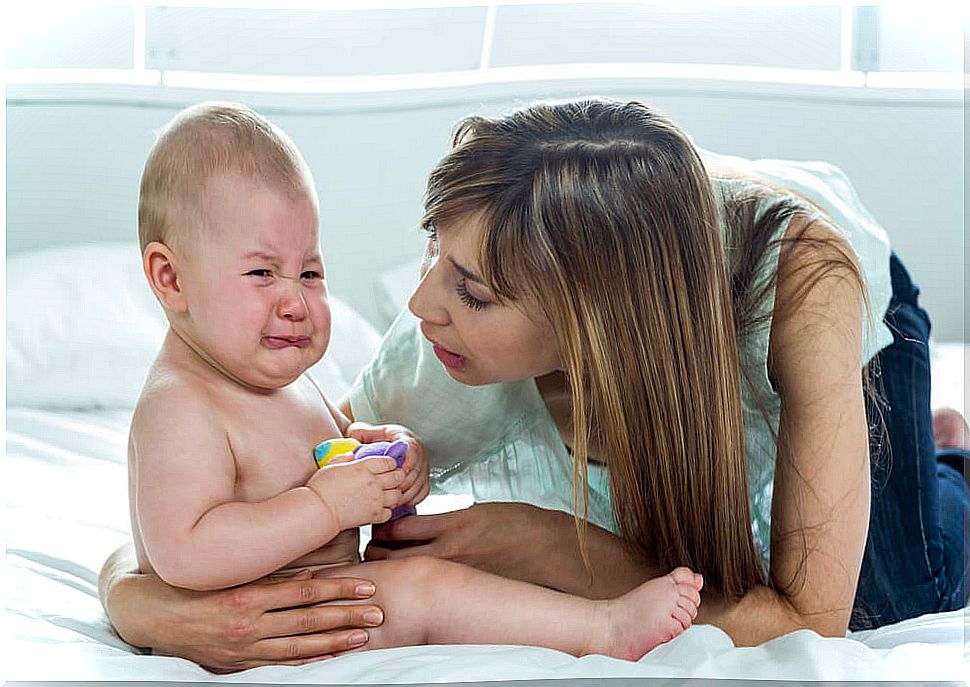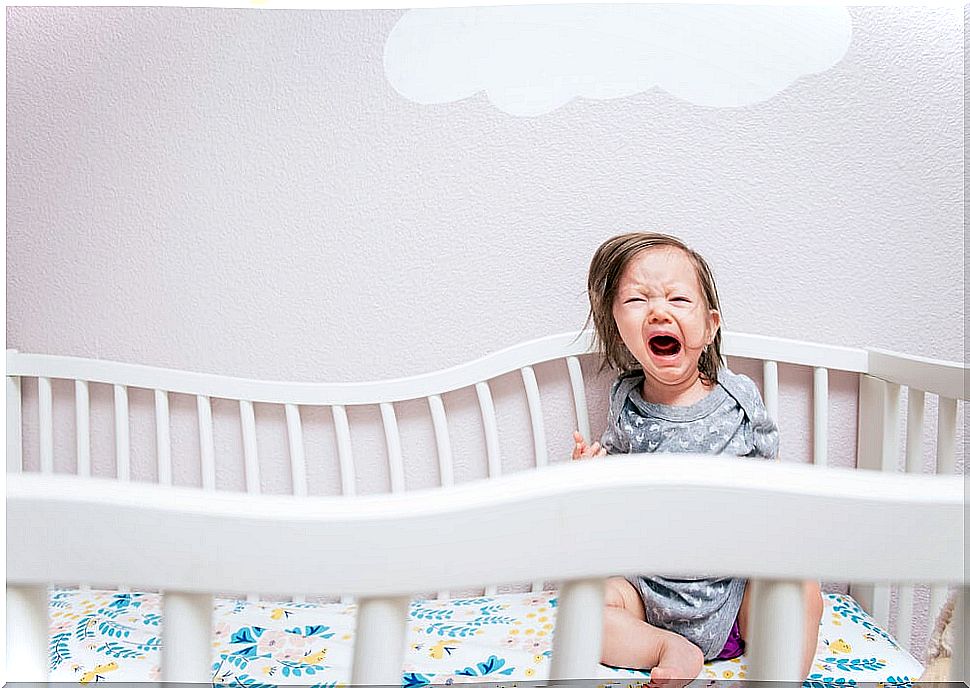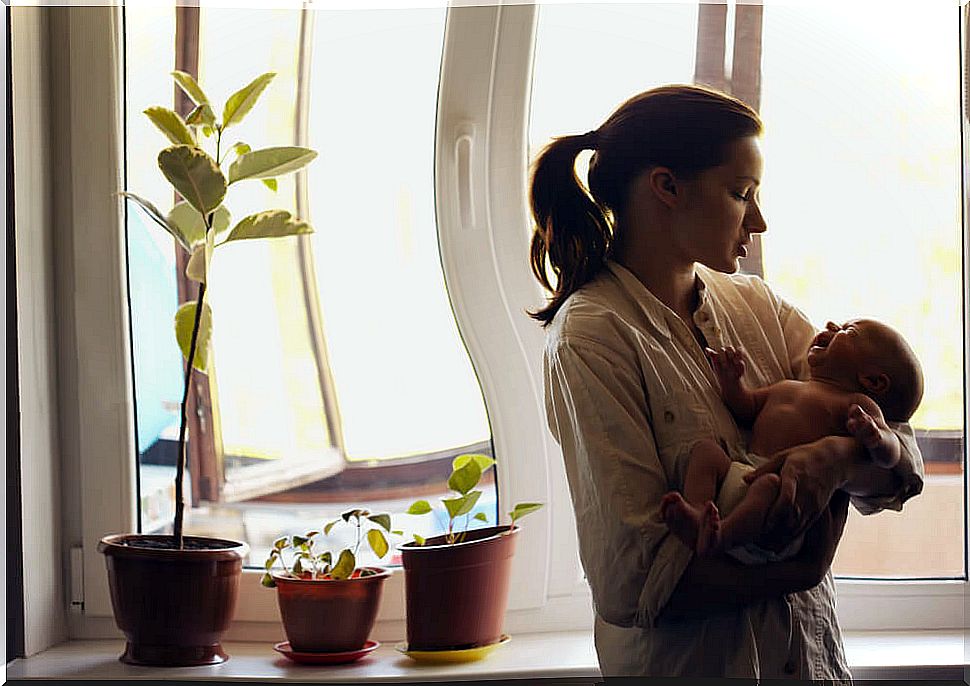Why You Always Have To Attend To A Crying Child
Why do you always have to attend to a crying child ? Crying is crucial for the survival of babies. Through this reaction, the little ones demand the immediate attention of adults. It is interesting that adults have a brain mechanism that forces them to stop to listen and attend to a crying baby.
On the other hand, crying can become a tremendously aversive sound. It is normal that we want it to stop. For that, we must attend to the crying child.
The tears and the crying
There are different types of tears: basal, reflex and emotional. The latter are exclusively human. But beyond the meaning of tears, crying is a primitive nonverbal way to get support.
It helps to relate and to strengthen ties with other people. For this reason it is an important act for human survival. However, listening to the cry of children for more than two hours a day can be an act of great feat for some parents; especially when a baby cries “nonsense.”
For this reason, many specialists advise parents not to take care of a crying child in order not to spoil him. And of course, this method is effective in training the little one but it may not be so for their emotional health.
Why do you always have to attend to a crying child

There is a natural urge in parents to care for a crying child. Perhaps it is a subliminal and anxious desire to want to solve the reason for the child’s discomfort.
Actually, it is interesting to note that instinct tells parents to care for a crying child. To put it more simply, it is on your program. It is vital to assist the little one as it could affect their basic confidence. As a result, it will be difficult for you to develop deeper emotional bonds.
Also, the child is very likely to develop irrational fears and anxieties. Even those same negative emotions can accompany you for the rest of your life.
Why not just let a baby cry
Babies, before being born, have spent nine months in their mother’s womb in a warm environment. You are in a place where you are offered protection from the environment, noise and even accidents.
When children are born, they are left unprotected and totally dependent on their parents for survival. In fact, birth is stressful for the baby due to the great impact on its sensory and sensory world, even when delivery and pregnancy have been ideal.
The consequences of leaving a little one crying
Babies have a very high stress level for the first few months after they are born. In reality, little ones have to get used to a radical change, a new environment and new experiences.
For their part, parents must take care of it so that it continues to grow and develop. However, if children lack sufficient attention or physical contact, they will feel deep loneliness and mistrust.
This can happen mainly when the little one is still a baby and also during the first months of his life. However, these problems drag into youth and even adulthood.
Why does a child cry

There are those who classify crying to understand the true nature of crying in babies. There are currently two probable reasons why a baby cries. According to an article, the reasons why the little ones cry are divided according to time and event.
Crying over a present event
In this category is the crying motivated by some unmet need, discomfort, pain, cold, heat.
Crying can also occur in children because they want to be hugged or encouraged. Actually, it is sometimes a bit difficult to identify the true needs of a baby. However, this fact can play a very important role.
Crying is the baby’s only means of communication with the outside, since it lacks language and does not have communication skills.
Cry for a past event that is still present
Although it seems incredible, babies have the natural survival mechanism. This allows them to retain traumatic experiences to process later. In other words, if the little one cries about something in the moment, it may be due to the connection with past experiences that could not be resolved in the best way.
In fact, crying works as a measure of discharge of physical and emotional stress, the same that the little ones have accumulated over time.
This mechanism also occurs with adults: we go through a problem and a certain trigger is activated that works as a pretext to cry out for overdue feelings or situations. However, to avoid such traumatic experiences in the future it is of utmost importance to care for a crying child.
Steps to care for a crying child

Never leave it alone
Find out what happens to him to assess how to answer his call. Identify whether the crying is due to a reasonable need, pain, discomfort or anxiety.
However, if he cries for the correction of behavior, do not suffer. The child must observe that certain negative behavior will not help him to get what he wants. But, at the same time, you must interrupt him from time to time to show him that he has not been abandoned.
Convey security and confidence
Another good technique to attend to a crying child is to calm the crying through the chest, a strong hug or songs that you know he likes. Tickling or other distractions such as telling a story or story can help your little one feel safe.
Conclusions
Despite being very small, babies feel a lot of emotions. However, feelings such as frustration, confusion, abandonment, sadness, fear or anxiety can affect the child’s good development.
It is very important to care for a crying child. As a parent, you cannot protect your little one from life and the experiences, both positive and negative, that life entails.
However, you can help him through the greatest and most useful tool: unconditional love. But remember, this link must be expressed in words and deeds.
You can also learn techniques to help your child develop better. If you have the opportunity, visit a specialist so that he can help you in the great challenge of being a father.
There is nothing more valuable than having healthy and happy children. Therefore, you always have to attend to a crying child. And you, what do you think? Will it be good to attend the cry of a little one?







